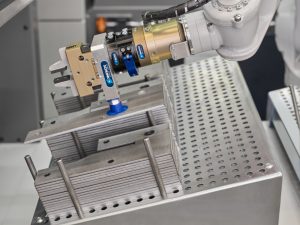 When production demands are high, mobile bending robots provide fab shops with much-needed flexibility. As productivity levels have increased due to the introduction of high-speed Fiber laser cutting systems, so has the demand for additional bending throughput and capacity. Offline programming capabilities have certainly freed up additional press brake capacity, but there is still a need for further increases in capacity in most cases. One of the biggest opportunities for gaining additional throughput and capacity is with bending automation.
When production demands are high, mobile bending robots provide fab shops with much-needed flexibility. As productivity levels have increased due to the introduction of high-speed Fiber laser cutting systems, so has the demand for additional bending throughput and capacity. Offline programming capabilities have certainly freed up additional press brake capacity, but there is still a need for further increases in capacity in most cases. One of the biggest opportunities for gaining additional throughput and capacity is with bending automation.
Press brake automation comes in many different sizes and equally for many different applications. Many of the lighter gauge parts that require bending automation do so, not only for the larger lot sizes but also for keeping the pace with fiber lasers and high-speed press brakes as well. Bending speeds of one inch per second are not unusual for high-speed brakes, and the level of speed and endurance required from the operator can also be demanding.
Off-Shift Operations
One of the key opportunities derived from press brake automation is the ability of the systems to operate in the off-shifts to increase throughput. Utilizing automation provides the flexibility to operate a press brake in the off-shifts and fully utilize the additional bending capacity created with press brake automation. Today’s automated mobile bending robots allow the press brake to be operated manually during working shifts and then with the quick addition of a mobile bending robot, become completely automated providing the ultimate flexibility with bending operations. In the case of mobile bending robot systems, they can be connected directly to a press brake within 10 minutes. The flexibility to run in off-shifts and over long weekends greatly increases productivity, efficiency, capacity, and revenue.
Easy offline Programming
When working with earlier offline robot programming systems, what used to take 30 minutes to accomplish now takes only five minutes with modern offline programming systems. The time to create a basic robot bending program is now almost synonymous with the time it takes to create flat part nests. With offline programming, you now have a system that can quickly program parts based on the bending cell. Once the program is created and saved, it can be called up at any time; during an operator’s absence, during off-shifts, or on weekends.
Changing the Status Quo
For overall productivity and flexibility, adding mobile robot automation and offline programming greatly changes the status quo in bending. A single press brake operator can now manage multiple bending cells, keeping the materials supplied and tending to quality control for each cell. Press brakes no longer need to sit idle during breaks, meetings, and shift changes. In the case of when an operator calls in sick or is out for a prolonged period of time, the mobile automaton is there to assist. Mobile robots can also be shared and moved within the shop to wherever there is a need for additional bending capacity and throughput.
By Frank Arteaga, Head of Product Marketing, Bystronic Inc., Hoffman Estates, IL
Voice.bystronic@bystronic.com
